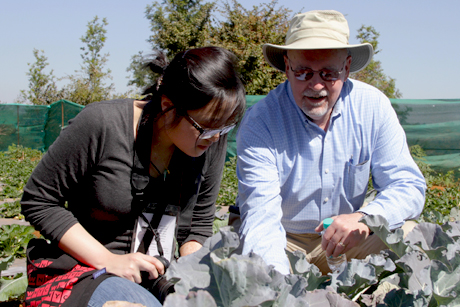Coffman receives inaugural World Agriculture Prize
By Stacey Shackford

Throughout his 43-year career, Cornell plant breeder Ronnie Coffman has sown seeds of scientific and social change across continents and generations.
Now his efforts are being recognized with the inaugural World Agriculture Prize, awarded by the Global Confederation of Higher Education Associations for Agricultural and Life Sciences (GCHERA), an organization that represents more than 600 universities worldwide.
As a rice breeder at the International Rice Research Institute in the Philippines in the 1970s, Coffman, Ph.D. ’71, helped one generation survive the ravages of war by ensuring food security throughout Southeast Asia.
As leader of the Borlaug Global Rust Initiative – and the Durable Rust Resistance in Wheat project funded by the Bill & Melinda Gates Foundation and the UK Department for International Development – he is helping another generation combat new strains of wheat rust that threaten to devastate world food supplies.
As the professor behind Cornell’s popular Agriculture in Developing Nations course, director of International Programs in the College of Agriculture and Life Sciences (IP-CALS), and organizer of Ph.D. training courses at the West African Center for Crop Improvement, he is mentoring the next generation of plant breeders and international development professionals.

“The world’s farmers need access to the best science that the many great institutions of GCHERA can deliver in order to produce crops that are nutritionally adequate and best adapted to future challenges,” Coffman said during his acceptance speech at Nanjing Agricultural University in China Oct. 20.
New technologies – including biotechnologies – must be made accessible to all the world’s farmers so that nutritionally superior seeds that are well-adapted to climate change are put in the hands of farmers with limited resources, he added.
Coffman also advocated for the advancement of women in agriculture and science, and he committed the $50,000 proceeds of the prize to AWARE (Advancing Women in Agriculture Through Research and Education), a new initiative to ensure that gender is considered in all IP-CALS activities, from events to funding proposals.
“Women hold the greatest potential to make significant impacts in rural development,” said Coffman. “Colleges of agriculture and life sciences need to empower women as future champions around the globe so they can become the entrepreneurs of their own future as well as the planet’s.”
Coffman was nominated for the award by Kathryn Boor, the Ronald P. Lynch Dean of CALS, who said he embodied the college’s mission of “knowledge with public purpose.”
“Ronnie excels as an agent of change. He has spent his career ensuring that people with scarce resources in some of the world’s most populous countries have access to the agricultural science they need to produce crops best adapted to the challenges they face,” Boor said.
A Kentucky native, Coffman had never even seen the ocean prior to coming to Cornell as a graduate student in 1967. His first trip off the continent was to Puerto Rico as a participant in the class he now leads. Coffman now travels more than 150 days and 250,000 miles a year in pursuit of advancements in agriculture and rural development.
Coffman joined the Cornell faculty in 1981 and has served as director of IP-CALS since 2001. Previous positions include chair of the Department of Plant Breeding and Genetics, CALS associate dean for research and director of the Cornell University Agricultural Experiment Station.
Stacey Shackford is staff writer at the College of Agriculture and Life Sciences.
Media Contact
Get Cornell news delivered right to your inbox.
Subscribe